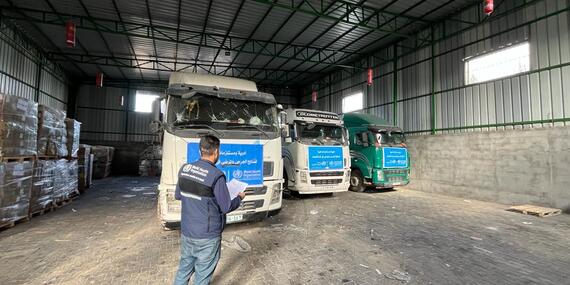Today's top news: Occupied Palestinian Territory

Occupied Palestinian Territory
Yesterday, a team from OCHA and the World Health Organization (WHO) visited a hospital in Khan Younis after it was struck, reportedly killing five people, including a five-day-old child. A training centre run by the Palestine Red Crescent Society within the Al Amal hospital was severely damaged.
During their mission, OCHA and WHO staff witnessed extensive damage and displacement of civilians. Some 14,000 internally displaced people were sheltering at the hospital when it was hit. WHO says many have now left, and those who remain are terrified for their safety and planning to relocate.
International humanitarian law requires that hospitals, ambulances, health workers and people seeking care be protected at all times.
OCHA has warned that Gaza is a public health disaster in the making, and recent mass displacement across southern Gaza is fueling disease outbreaks. More than 400,000 cases of infectious diseases have been reported since October 7th, with some 180,000 people suffering from upper respiratory infections. There have also been more than 136,000 cases of diarrhea reported – half among children under the age of five.
Humanitarian partners continue to address the critical lack of hygiene and safe drinking water in Gaza, despite ongoing challenges to response efforts. Since October, some 1.4 million people in Gaza have been reached at least once with some water and sanitation assistance. This includes the distribution of more than 120,000 cubic metres of water. Nearly 140 sanitation units have also been installed or rehabilitated at shelters for internally displaced people.
Our humanitarian partners are also providing health care at shelters, with the help of 150 medical teams. Work continues to expand access to primary health care services by increasing the number of medical points serving internally displaced people, as less than half of the 325 designated shelters have them.
Meanwhile, the UN and our humanitarian partners have been unable to deliver urgently needed life-saving humanitarian assistance north of Wadi Gaza for three days due to access delays and denials, as well as active conflict.
This includes medicines that would have provided vital support to more than 100,000 people for 30 days, as well as eight trucks of food for people who currently face catastrophic and life-threatening food insecurity.
Humanitarian organizations are calling for urgent, safe, sustained and unhindered humanitarian access to areas north of Wadi Gaza, which has been severed from the south for more than a month.
